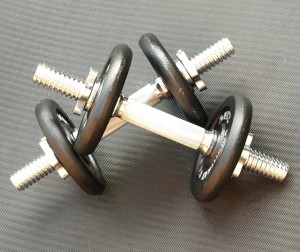 In the 1990s, doctors and nutritionists advocated using carbohydrates, almost exclusively, for energy. Low-fat, low to moderate protein diets were all the rage. And in that decade the obesity rates continued to skyrocket. Obviously high carbohydrate diets were not the answer!
In the 1990s, doctors and nutritionists advocated using carbohydrates, almost exclusively, for energy. Low-fat, low to moderate protein diets were all the rage. And in that decade the obesity rates continued to skyrocket. Obviously high carbohydrate diets were not the answer!
Putting on muscle mass and strength training requires a combination of nutrition that builds muscle and burns fat. You’ll want to show off those ripped muscles and don’t want a layer of fat covering them up. To that end you’ll want to train your body to burn fat, as it was intended to do, as well as use protein both before and after workouts to repair and build muscle.
The amount of protein you need as a body builder will be different than the recommended daily allowance (RDA) by the US Federal Government. Those numbers are intended for use in people who are mostly sedentary to performing light to moderate exercise. Working out in the gym 5 days a week doing resistance training and cardio work qualifies as something entirely different.
The RDA is 0.8g/kg or 0.4g/lbs of protein. If you weight 200 pounds that equates to 80 grams of protein per day. However, if you are working hard you’ll need closer to 1g of protein per pound of body weight per day. At 200 pounds, that 200 grams of protein, and probably difficult to get in a normal dietary intake.
The best sources of protein you can eat are red meat, poultry, fish, dairy, eggs and nuts.
But you won’t be able to get 200 grams of protein from just foods or you’ll be eating all day long! Instead, you’ll also want to supplement with protein powder both before and after your workouts. The protein in the pre-workout is to give your muscles the protein building blocks it needs so your body doesn’t burn muscle during the workout.
 In your post workout, researchers have found that a combination of soy, casein and whey proteins are best because they metabolize at different rates and provide your body with a steady incoming stream of protein over the day. (1) Researchers have also found that using a protein and carbohydrate combination after your workout will reduce muscle damage and increase your energy burn in the next 24 hours. (2)
In your post workout, researchers have found that a combination of soy, casein and whey proteins are best because they metabolize at different rates and provide your body with a steady incoming stream of protein over the day. (1) Researchers have also found that using a protein and carbohydrate combination after your workout will reduce muscle damage and increase your energy burn in the next 24 hours. (2)
How much protein you eat, the type of protein, and when you eat it will all have an impact on the rate of growth of your muscle mass, the repair time it takes your body to build muscle and the strength you’ll acquire. Incorporating a well balanced diet, protein supplement to reach your gram goal, at least 8 hours of sleep each night and plenty of fresh water are all necessary to achieve the goals you’ve set out for yourself.
References:
(1) American College of Sports Medicine: New study finds a protein combination is best to consume post-workout for building muscle
http://www.eurekalert.org/pub_releases/2012-04/sl-nsf042312.php
(2) Medicine and Science in Sports and Exercise: Timing protein intake increases energy expenditure 24-h after resistance training
http://www.ncbi.nlm.nih.gov/pubmed/19997003
Resources:
BrianMac: The latest on pre/post workout nutrition
http://www.brianmac.co.uk/articles/article034.htm
Australian Sports Commission: Eating Before Exercise
http://www.ausport.gov.au/ais/nutrition/factsheets/competition_and_training/eating_before_exercise
Muscle for Life: The Truth About Protein Absorption
StrongLifts: Protein 101: How much do you need and best sources
http://stronglifts.com/protein-daily-needs-myths-best-sources-protein/
BuiltLean: Are you eating enough protein to build protein
http://www.builtlean.com/2012/12/24/protein-build-muscle/
Breaking Muscle: How much protein do you need
http://breakingmuscle.com/nutrition/how-much-protein-do-you-need-science-weighs-in
Muscle for Life: How much protein is needed to build muscle
http://www.muscleforlife.com/how-much-protein-build-muscle/


Leave a Reply